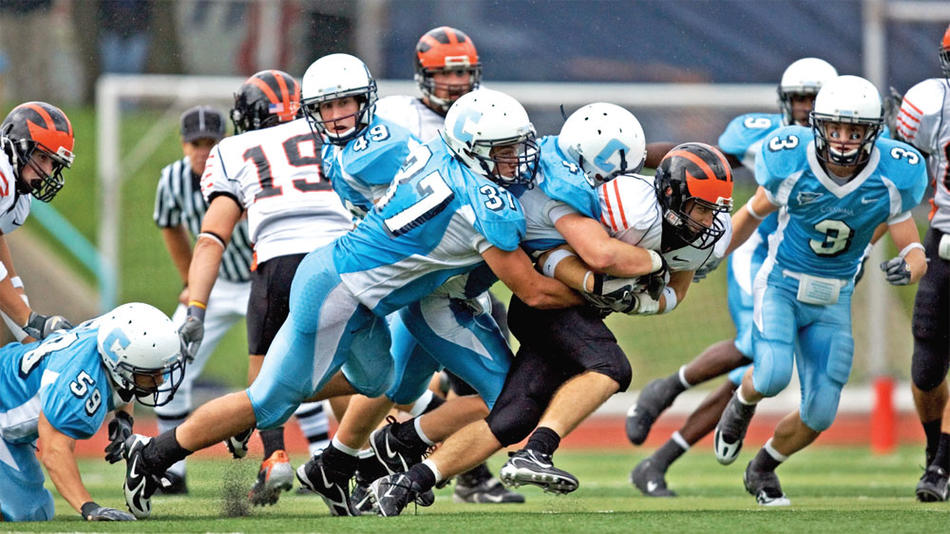It has been a long time since Columbia University was known as a sports powerhouse. Some have even taken pride in our less-than-fearsome reputation on the playing field, as if it attests to the university's academic stature.
Over the past five years, however, Columbia has been fostering another kind of pride by rebuilding its athletics programs. It's a long process, one that began with the formation of a special presidential task force to assess the needs of Lions varsity teams and the 2004 hiring of athletics director M. Dianne Murphy, as a direct report to President Bollinger. "Our belief is that everything Columbia does," says Murphy, "should be excellent."
The Lions certainly are on the right track. Five Columbia teams won Ivy League championships last year and the football team posted a record of 5Ð5, breaking even for the first time in a decade. And now alumni seem to share Murphy's confidence. On October 12, the University launched a $100 million fundraising drive, The Columbia Campaign for Athletics: Achieving Excellence, and announced that more than $46 million has already been raised. The campaign kicked off in Low Library on the eve of Columbia's Homecoming Weekend with the announcement of the two largest campaign pledges yet made to the Columbia athletics campaign: more than $10 million from Columbia Trustees Chair William Campbell CC'62, the CEO of the software company Intuit, and $5 million from Robert Kraft CC'63, the owner of the New England Patriots. During a halftime ceremony at homecoming, the Lions's football field was named in Kraft's honor.
The athletics campaign, led by a committee of over a dozen alumni volunteers including several trustees, sets a goal of $100 million for "people, places, and programs." That includes $20 million for endowments for coaching and administrative positions, $70 million for facilities, and $10 million for program funds for individual sports, including upgraded technology and other training enhancements, sports program endowments, and career development and services for student-athletes. "We're going to fix once and for all some deep-rooted issues that have plagued Columbia athletics," says Murphy. "It all starts with resources. The University now is committed to building world-class facilities that foster championship performances, to attracting and retaining the best coaches, and to providing an environment that will make Columbia the first choice for the best student-athletes."
Since Columbia established varsity women's sports programs in 1983, the number of student-athletes has doubled to about 800, while the square footage available for sports teams has remained roughly the same. To address the need for more space, the University plans to construct a new sports center at the Baker Field Athletics Complex at the northern tip of Manhattan. The center would feature meeting rooms, coaches' offices, strength and conditioning facilities, and student lounge areas. A new boathouse and tennis clubhouse also would be built at Baker Field.
Fourteen outdoor varsity sports programs eventually would be relocated there from the Dodge Fitness Center on the Morningside Heights Campus, opening up space at Dodge. That would benefit students, faculty, and alumni who use the center's courts and gym equipment and other varsity sports programs located there. If the campaign is successful, Dodge would be fully renovated, too.
As to the importance of coaching endowments, Murphy says look no further than Norries Wilson, who last year helped the football team break a three-year losing streak. Wilson, a former University of Connecticut offensive coordinator, was hired in 2006 to an endowed head coach position honoring Patricia and Shepard Alexander '21CC, one of two such jobs at Columbia. (The other endowed coaching position is the Andrew F. Barth Head Coach of Wrestling, held by Brendan Buckley.)
"Coaching endowments, just as with endowed professorships, provide recognition of outstanding performance," she says. "We need to have the best people and then hold them accountable."



